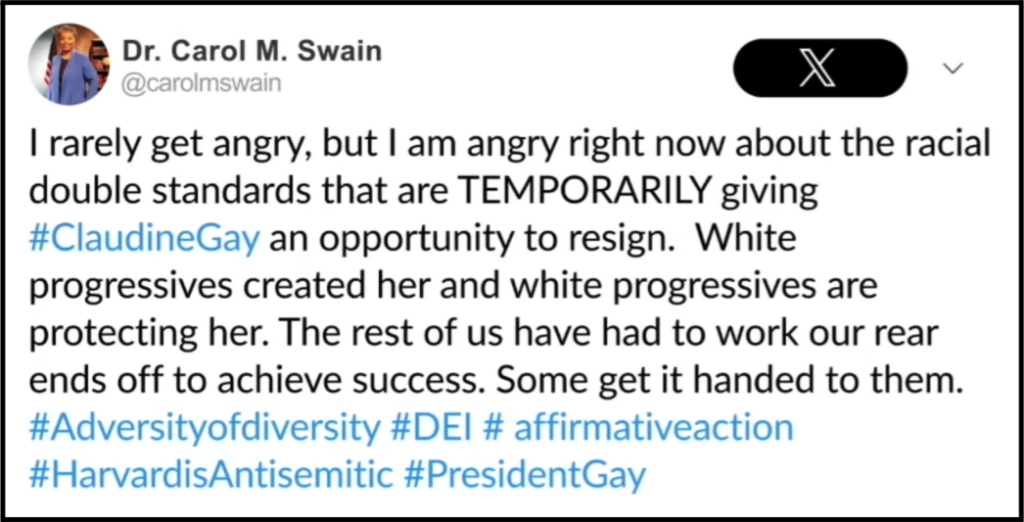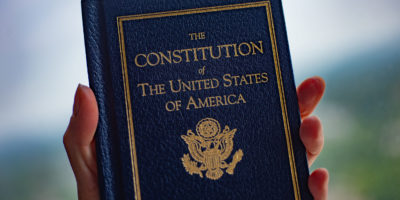By Sau O’Fallon
2023 had Harvard, the nation’s most prestigious university, in the headlines on two notorious occasions. From Harvard’s entry-point of student acceptance based on race to the ‘protecting’ of the school’s leader from wrong-doing due to what many critics claim is due to race.
Calls against discriminatory practices for school admissions have been a battle for years, and Harvard has been in the cross-hairs of those who defend meritocracy over race-based criteria. “…we don’t need special treatment – we demand equal treatment!” was the heart of a joint letter submitted to the United States Commission on Civil Rights (USCCR) in April 2023, presented by the Californians for Equal Rights Foundation (CFER) and ten partner organizations, which included Asians For Liberty. The charge to the USCCR was not only for better protection for members of the Asian-American community through strengthened law enforcement and prosecution of perpetrators but also for meaningful solutions to deal with the systemic issue of anti-Asian discrimination in education.
For nearly a decade, the founders of the Asian American Coalition for Education (AACE) have been fighting side by side with Students for Fair Admissions (SFFA) and with a multitude of Asian-American organizations jointly filed a civil-rights complaint against Harvard, exposing anti-Asian discrimination in college admissions on the national stage. AACE has galvanized Asian communities nationwide, standing firmly behind SFFA’s lawsuits against Harvard and the University of North Carolina (UNC).
Then, a historic victory happened on June 29, 2023, when The U.S. Supreme Court struck down discrimination in college admissions by ruling against race-based affirmative action admissions practiced by Harvard and UNC.
Harvard then had their 2023 conclude with another ‘race-based’ incident. Highly dedicated to Diversity, Equity, and Inclusion (DEI), Harvard has been under recent scrutiny for the “lack of action” against disgraced president Claudine Gay, the first black leader to take the helm:
- Harvard first faced calls to fire Gay after she stood by the more than 30 Harvard student groups that published a letter claiming they held Israel “entirely responsible” for Hamas’ October 7 terrorist attacks. This lack of action resulted in Jewish students being verbally attacked and caused heightened concerns about Jewish safety.
- Then Gay faced further calls to step down after the disastrous House testimony in December on antisemitism, in which the embattled president told Rep. Elise Stefanik (R-NY) that calls for genocide against the Jews would only violate Harvard’s rules depending on their “context.”
- Harvard announced Gay would remain president despite the school losing a reported $1 billion in donations due to her handling of antisemitism. Billionaire Bill Ackman, a Harvard graduate and donor, claims the school won’t fire her because it would look like it was “kowtowing” to him.
- Harvard had previously covered up its probe and threatened The New York Post when it looked into 27 plagiarism allegations against Gay. Charges of Gay’s plagiarism ranged from journalists and former professor Carol Swain.
Carol Swain, a former political science professor at Vanderbilt University and an acclaimed African-American scholar, said, “Harvard can’t condemn Ms. Gay because she is the product of an elite system that holds minorities of high pedigree to a lower standard.”

On Monday, January 1, 2024, Gay was hit with six (6) new plagiarism allegations. Gay then stepped down the next day as president, the shortest stint for that position in the university’s history, and the Students at the university welcomed the action. In her resignation, Gay cited how she had been subject to racism since the attacks, writing: “It has been distressing to have doubt cast on my commitments to confronting hate and to upholding scholarly rigor—two bedrock values that are fundamental to who I am—and frightening to be subjected to personal attacks and threats fueled by racial animus.”
Yet the political science professor Gay, who has been on Harvard faculty since 2006, will now return to a position as a regular faculty member and will retain her nearly $900,000 annual salary.
Sources: cferfoundation.org 4/24/23; asianamericanforeducation.org 12/30/23; edib.harvard.edu/search/site/dei; nypost.com 1/2/2024 and 1/3/2024.











